Every week, Food52's Senior Editor Kristen Miglore is unearthing recipes that are nothing short of genius.
Today: Your everyday duck confit -- all you have to do is skip one big fat pricey ingredient.
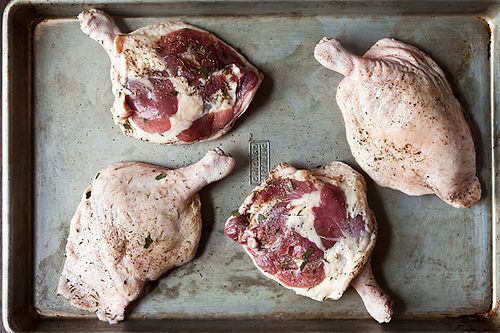
- Kristen
This is not the confit they teach in cooking school, or the kind served at restaurants. It's the kind you can make anytime -- all you need are a few good duck legs, a skillet, and some very basic spices. And it's just as good.
Confiting duck, technically, is just a matter of salting it long enough to draw out its water content, then preserving it by replacing that water with fat. Traditionally this is done by simmering the salt-cured legs in a big burbling vat of duck fat, which you are expected to already have.
It's not terribly hard to come into a bunch of duck fat. Slow roast two ducks and you'll have the two quarts of fat a standard confit recipe might require, easy. Or you could buy it retail in tiny containers. It will cost you an extra $50 or so and you will feel a little silly (or, you know, there's always this bucket).
But all of these demand a significant head start, one that food writer Melissa Clark skips right past, by exploiting the natural gobs of fat that come free in every duck leg. Her trick: Just render that fat out first. It's not traditional, but who cares?

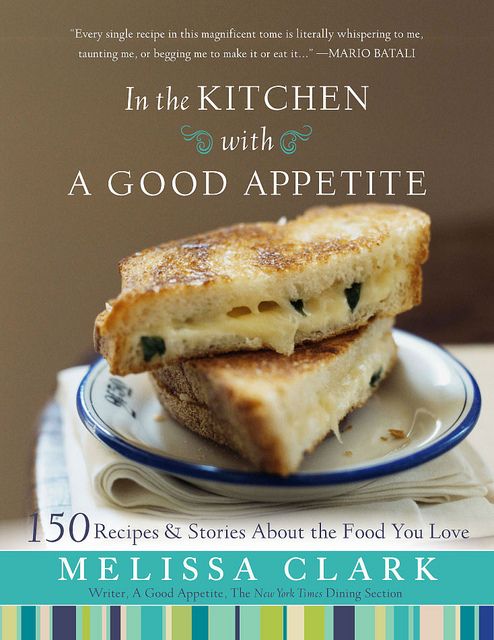
This is the most obvious perk of Clark's method, which she developed after feeling inhibited by this whole vat-of-duck-fat requirement and consulting with Eric and Bruce Bromberg, chef-owners at Blue Ribbon. But there's even more to its genius than this.
For example, you might think the recipe doesn't call for nearly enough salt: a teaspoon and a half -- barely enough for a subdued sprinkle on each side. But it's portioned deliberately, so that you don't have to rinse the excess salt away at the end of the cure stage as you would in many traditional confits. This is doubly good, because the cure stage leads right into the sear-in-a-hot-pan stage, which is much more fun without water and fat spitting angrily at each other.
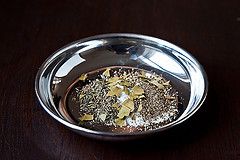
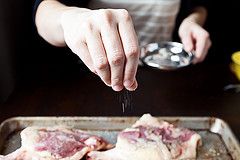
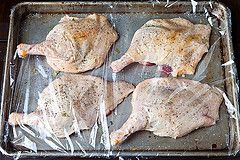
You'll sear away until you've collected about 1/4 inch of pooling fat in the bottom of the skillet, then you'll flip the legs, cover the pan with foil, and shelve it in the oven for a few hours, covered for most of the time. The lingering fat on top slowly trickles down into the meat, leaving a crackly sheath of skin behind, while the underside stays submerged.
Another bonus of this technique: you don't have to monitor the temperature with a deep-fat thermometer. A modest layer of fat in a heavy skillet at 325°F mostly babysits itself. (Another thing that babysits itself? A slow cooker. But I digress.)
When it's done, the duck will be golden and gorgeous, with jewels of dark luscious meat and a crisp-paper skin to put the best roast chickens to shame. Clark recommends serving with roasted potatoes, noodles, or bitter salad greens. But you should count on being down a leg or two, if you are weak of will (and/or unsuccessful in fending off trespassers, who will just stand there stony-eyed, gnawing on a leg over near the sink like a dog).
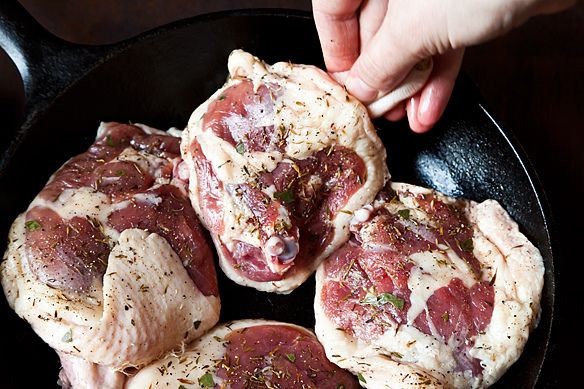
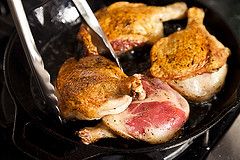
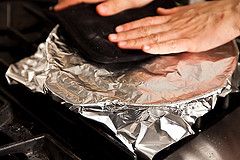
So for anyone who thought this was only the stuff of fancypants restaurants or roadside inns in southwestern France, consider this your starter confit -- one that you can make anytime you spot a nice set of legs at the market. Clark's simple dried thyme and bay cure is a good baseline, to be fiddled with later as you see fit (try star anise, dill, or coriander).
And on top of confit, guess what else you get? Duck fat! And lots of it. Stick it in the freezer so next time you're feeling proper, you can try confiting the old school way. Or forget the old school way, and use it all up: fry potatoes, sauté greens, work it into tart crusts, and smear it on your toast.
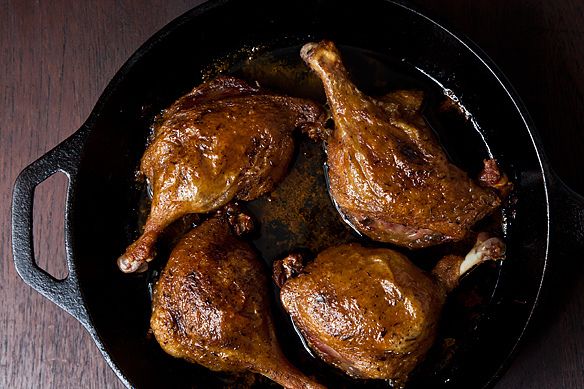
Melissa Clark's Really Easy Duck Confit
Adapted very slightly from In the Kitchen with a Good Appetite (Hyperion, 2010)
(As you may know, we're big on both salting early and long-cooking in ample fat around here.)
Serves 6-8
1 1/2 teaspoons kosher salt
1 teaspoon freshly ground black pepper
1/2 teaspoon dried thyme
1 bay leaf, crumbled
8 moulard duck legs (about 4 pounds total), rinsed and patted dry but not trimmed
See a slideshow and the full recipe (and save and print it) here.
Want more genius? Try Nekisia Davis' Olive Oil and Maple Granola
Got a genius recipe to share -- from a classic cookbook, an online source, or anywhere, really? Please send it my way (and tell me what's so smart about it) at kristen@food52.com.
Photos by James Ransom












See what other Food52 readers are saying.